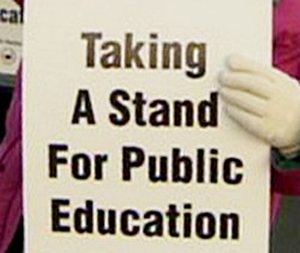Stop Paying the Rich; Increase Funding for Social Programs!
Quebec Government’s Privatization of Services Required by Parents and Youth
– Geneviève Royer –
More information is circulating which confirms that the Quebec government has handed over millions of dollars of public funds to private education companies which exploit problems facing parents and youth in a manner detrimental to them and the public interest. Data collected by the newspaper La Presse following an access to information request shows that over the last five years, more than $10 million has been removed from the public sector and put into the hands of private firms. It is done in the name of providing students with access to remedial education, psycho-education, speech therapy, and other such services but such access is precisely what they are being deprived of.
 Quebec’s Minister of Education, Jean-François Roberge, sent a letter to the directors general of school service centres on October 4, one day before World Teachers’ Day. The letter came in response to a family’s public denunciation of the fact that their child, diagnosed with a language disorder, was not given access to the speech therapist at the kindergarten she attended. In response the Minister cynically claimed the government is doing its duty by saying: “If unable to provide the services it deems necessary for a child, the school organization must use all the levers at its disposal to ensure the provision of services, such as by availing itself of the private sector.”
Quebec’s Minister of Education, Jean-François Roberge, sent a letter to the directors general of school service centres on October 4, one day before World Teachers’ Day. The letter came in response to a family’s public denunciation of the fact that their child, diagnosed with a language disorder, was not given access to the speech therapist at the kindergarten she attended. In response the Minister cynically claimed the government is doing its duty by saying: “If unable to provide the services it deems necessary for a child, the school organization must use all the levers at its disposal to ensure the provision of services, such as by availing itself of the private sector.”
Despite Minister Roberge’s indignation, the lack of services in schools is known and recognized by all school community interveners. Figures provided by the five sites of the Montreal Integrated University Health and Social Services Centre (CIUSSS) in 2021 show there are more than 11,400 children awaiting speech-language therapy services. In Montreal, more than 2,300 youth under the age of 18 are on waiting lists for speech-language therapy services.
The Quebec Association of Speech Language Pathologists and Audiologists underscores the government’s responsibility for this state of affairs. “Limited speech-language pathology resources and disparities in the organization of services from one region to another have led to heartbreaking choices. As a result, some School Service Centres only serve students with severe difficulties, leaving out all those with mild to moderate difficulties, while others offer a universal service, but only at the preschool and 1st cycle of elementary school, leaving out all older students,” the Association notes.
Jacques Landry, president of the Fédération des professionnelles et professionnels de l’éducation du Québec (FPPE-CSQ) adds that “[…] reimbursing the costs incurred privately by a single family is not the magic wand that will sort out the chronic problems of lack of services in schools and attraction and retention of professional staff, inequity of access and the confusion that reigns in the financing and organization of services for students with special needs […]
“At this very moment, in all of Quebec’s regions, there are over 500 vacant positions for school professionals, including nearly 100 in speech-language therapy. We are shocked and concerned to see a similar situation in psychology and psycho-education. This is huge, especially when one considers that each professional may provide services for between 1,000 and 2,000 students.”
 Julie Tassé, president of the Syndicat des professionnelles et professionnels Laval-Rive-Nord (SPPLRN-SCFP 5222) also points out: “In the short term, opening up to the private sector with reimbursement by the public school may seem attractive to parents. But it is only a temporary and cosmetic measure. In the medium and long-term, it empties the public network, and it’s the children of non-wealthy families who will be deprived of services.”
Julie Tassé, president of the Syndicat des professionnelles et professionnels Laval-Rive-Nord (SPPLRN-SCFP 5222) also points out: “In the short term, opening up to the private sector with reimbursement by the public school may seem attractive to parents. But it is only a temporary and cosmetic measure. In the medium and long-term, it empties the public network, and it’s the children of non-wealthy families who will be deprived of services.”
Clearly, the government’s decision to inadequately fund the education system and ensure the necessary personnel is directly linked to its decision to hand over public funds to private interests. Public funds must be used to finance the solutions put forward by education experts, those who work with students on a daily basis. This is why the Marxist-Leninist Party of Canada demands that governments stop paying the rich and increase investments in social programs. Political renewal to remove governments which do not represent the public interest is the order of the day.


